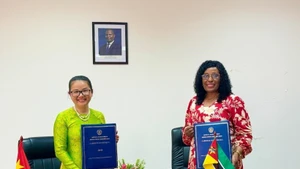According to a report evaluating the pilot program for digital student records at the primary level, Thai Van Tai, Director of Primary Education at the Ministry of Education and Training, noted that local departments of education and training have developed plans and collaborated with service providers to train schools on digital student records.
Many localities have established steering committees for digital transformation and piloting digital student records, issuing detailed plans and assigning specific tasks while coordinating with infrastructure service providers to ensure technical requirements of the Ministry's regulations.
So far, the pilot programme has laid the foundations for refining the management and use of digital student records, which will eventually be implemented nationwide.
All 63 provinces and cities have collaborated with digital student record providers, establishing data connection addresses and designating personnel to handle related issues locally. Some service providers are ready to manage digital student records for localities.
During the 2023-2024 academic year, the pilot programme on using digital student records was deployed at the primary level.
The results showed that the programme has helped ensure convenience in storing, managing, and using school records in schools; reduce workload for teachers; and make the process of managing students' learning and training results more transparent. The implementation ensured that no additional costs were incurred by students or their parents.
However, the deployment also revealed some limitations. The use of electronic records has not ensured seamless connectivity between different educational levels or schools within the same level.
There have been no detailed regulations on the management and use of electronic records, and the transition from paper to digital records remains incomplete.
Notably, digital student records still require printing, signing, and stamping for administrative procedures, which undermines their effectiveness.
In addition, the digital transformation in education is facing challenges and difficulties including incomplete shared digital resources, insufficient digital resources and limitations on information technology infrastructure at schools and equipment for teachers and students, particularly those in mountainous areas.
 |
| The programme has helped reduce workload for teachers; and make the process of managing students' learning and training results more transparent (Photo: laodongthudo.vn) |
Nguyen Bao Quoc, Deputy Director of the Department of Education and Training in Ho Chi Minh City, said that updating student information on the education database is challenging due to frequent changes in student residences, and intermittent attendance.
There are also no specific mechanisms for verifying foreign students' identities, as they are not managed in the national population database.
Furthermore, there is no detailed financial mechanism for purchasing digital signatures for teachers beyond the free trial period.
Representatives from Hau Giang Provincial Department of Education and Training noted that regulations on using digital student records have not been issued, leading to the continued use of paper records, which can cause confusion and overlap.
Education experts suggest that implementing digital student records requires a tailored approach to suit local realities to achieve the set goals.
The Hoa Binh Provincial Department of Education and Training proposed that the Ministry of Education and Training issue regulations on creating, managing, storing, using, connecting, and sharing electronic records. They also suggested standardising data among software used in schools, ensuring student information and database security when digitised.
Additionally, they recommended establishing a pricing framework and funding source for digital student records to provide legal grounds for provincial councils. The Ministry should organise training sessions for key personnel and IT specialists in departments of education on managing digital records.
Meanwhile, the Hau Giang Provincial Department of Education and Training requested that the Ministry issue guidelines for implementing digital student records to ensure uniform implementation across departments and educational institutions.
They also suggested collaborating with the Ministry of Public Security to provide identification codes for all students as part of the national digital transformation plan from 2022 to 2025, with a vision to 2030.
Deputy Minister of Education and Training Pham Ngọc Thuong acknowledged that implementing digital student records is a complex task with significant impact across a wide scope, with varying advantages and challenges in different localities.
He asked functional agencies under the Ministry to gather feedbacks from localities to address the limitations in implementing the pilot programme, while reviewing relevant legal documents to unify concepts and terminology during implementation.
Following the primary level, the Ministry of Education and Training will continue by piloting the program at the secondary level in all 63 provinces and cities during the 2024-2025 academic year to improve transparency and quality in the management of education activities.
The pilot of the digital files is an important move towards a more effective and modern education system, creating favourable conditions for teachers and parents to update the academic performance of students.
















